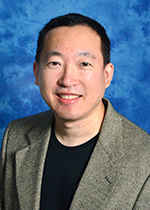Our Team
Principal investigators at the Allegheny Health Network Institute of Cellular Therapeutics:

Dr. Yong Fan
Yong Fan’s leading research is focused on understanding the central, or thymic, control of immune tolerance. The goal is to use the knowledge to develop clinical applicable protocols to prevent and treat autoimmune diseases such as Type 1 diabetes, and to modulate the adaptive immune system for transplantation tolerance. Dr. Fan, Ph.D., oversees a team that also includes Asako Tajima, MD, and Isha Pradhan, Ph.D.
The team is focusing on two projects, including bioengineering thymus organoids to modulate the adaptive immune system to treat immune dysregulatory disorders, and investigating whether they can regulate the expression of thymic islet autoantigens to prevent or reverse islet autoimmunity.
The team already has demonstrated the essential roles of insulin gene expression in medullary thymic epithelial cells (mTECs) for mediating central tolerance of pancreatic beta cells and identified a possible common mechanism for development of T1D-associated, extrapancreatic autoimmune disorders and multi-organ autoimmune diseases, including Addison’s disease and diabetes. The team has also identified growth hormone deficiency as a possible underlying mechanism for the development of nonalcoholic fatty liver disease, insulin resistance and Type 2 diabetes. The team also has developed a protocol to generate injectable, functional mini-thymus organoids.
Dr. Fan was a research assistant professor in the Division of Immunogenetics, Department of Pediatrics, at University of Pittsburgh School of Medicine. He has a doctorate in developmental biology from the University of Pittsburgh. He is an associate Professor in the Department of Biological Sciences at Carnegie Mellon University, and an assistant Professor in the department of Microbiology and Immunology Drexel University College of Medicine. He also recently received an assistant professor appointment from Drexel University College of Medicine, Department of Microbiology and Immunology.
Select publications from researchers at the Allegheny Health Network Institute of Cellular Therapeutics:
A miniaturized approach for robust thymus organoid production. Liu W, Fan Y. Cell Reports. 2025 Apr 15. PMID: 40238629.
Engineering immune organoids to regenerate host immune system. Patel S, Liu W, K R, McCormick C, Fan Y. Current Opinion in Genetics and Development. 2024 Dec. PMCID: PMC11588509.
Targeting interleukin-6 as a treatment approach for peritoneal carcinomatosis. Dadgar N, Sherry C, Zimmerman J, Park H, Lewis C, Donnenberg A, Zaidi AH, Fan Y, Xiao K, Bartlett D, Donnenberg V, Wagner PL. Targeting interleukin-6 as a treatment approach for peritoneal carcinomatosis. Journal of Translational Medicine. 2024 Apr 30. PMID: 38689325.
De novo construction of T cell compartment in humanized mice engrafted with iPSC-derived thymus organoids. Fan Y. Nature Methods. 2022 Oct. PMID: 36064772.
Multiple Lesions Contribute to Infertility in Males Lacking Autoimmune Regulator. Warren BD, Ahn SH, Brittain KS, Nanjappa MK, Wang H, Wang J, Blanco G, Sanchez G, Fan Y, Petroff BK, Cooke PS, Petroff MG. The American Journal of Pathology. 2021 Sep. PMID: 34126085.
Bioengineering Thymus Organoids to Restore Thymic Function and Induce Donor-Specific Immune Tolerance to Allografts. Fan Y, Tajima A, Goh SK, Geng X, Gualtierotti G, et al. Molecular therapy: The Journal of the American Society of Gene Therapy. 2015. PMID: 25903472
-
Contact
Patrick Hnidka, Administative Supervisor

